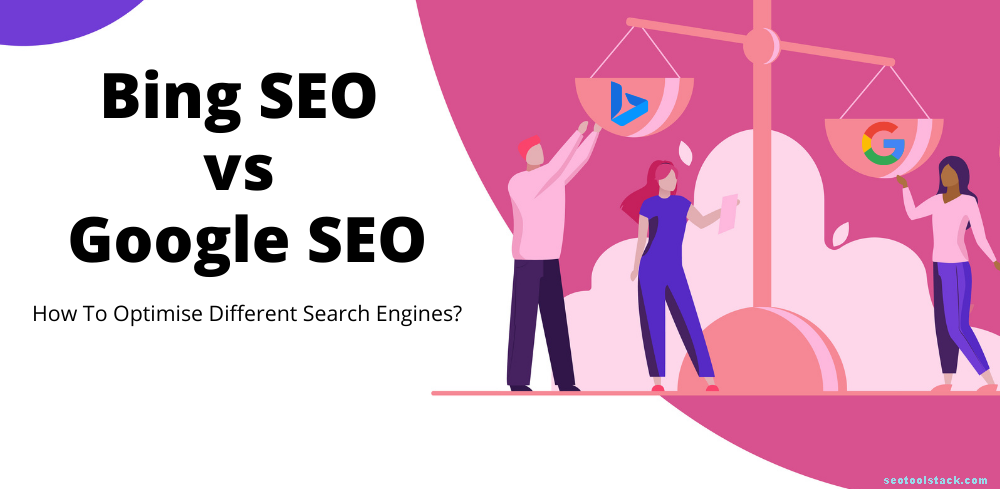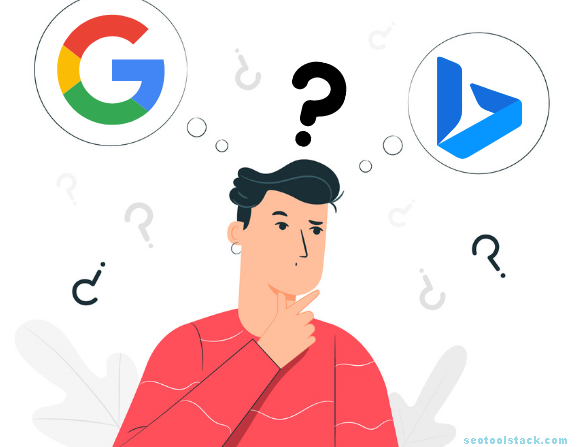

For many years, Google has dominated search. However, Microsoft Bing has experienced a sharp increase in user base when the company combined AI capabilities with OpenAI's ChatGPT.
So, which search engine is superior in terms of SEO and user experience, Google or Bing? And how do they differ from one another?

The search engine from Google has a fascinating backstory. It all began in 1996 when Stanford Ph.D. students Larry Page and Sergey Brin started developing a search engine named
The first Google Doodle debuted in 1998, the year Google was formally formed. The business was given a $100,000 investment the same year, which launched it.
The PageRank algorithm, which sorted search results based on the quantity and quality of backlinks, was the innovation that gave rise to Google Search. Because of this, Google's results were more pertinent than those of its rivals.
Google added a number of cutting-edge features as it worked to improve its search algorithms, such as the "I'm Feeling Lucky" button that led users to the top result.
The launch of Google's advertising platform, AdWords, in the early 2000s greatly increased the company's earnings. Additionally, the search engine underwent a number of modifications, including the 2006 "BigDaddy" infrastructure update.
As smartphones proliferated, mobile search gained attention, and Google responded by releasing mobile-friendly algorithms. The business also experimented with voice search and unveiled the Knowledge Graph, which offers straightforward responses to inquiries.
Artificial intelligence and machine learning have been key components in improving search results in recent years. The 2019 introduction of the BERT algorithm sought to improve comprehension of the word context in a search query.
Bing
Microsoft's search engine, Bing, was formally introduced on May 28, 2009, with the goal of challenging Google's leading search engine.
Microsoft had other search engines before Bing, such as MSN Search and Live Search, but they weren't as popular. Microsoft aimed to offer a more aesthetically pleasing and intuitive search experience with Bing.
Microsoft introduced features like video previews immediately in the search results, emphasising the usage of visual material. High-quality photos were frequently featured as the Image of the Day on Bing's homepage.
Over time, Bing has been connected with a number of Microsoft services and products, including Office, Xbox, and Windows. In 2009, Microsoft and Yahoo teamed again, with Bing powering Yahoo's search results.
In comparison to Google, Bing is the underdog, yet it has progressively gained market share. It set itself apart by emphasising travel, retail, and local search while offering special services like cashback on Bing purchases.
Bing was also used by Microsoft Cortana, their voice-activated assistant, to power its search feature.
Even if Bing's market share isn't higher than Google's, it has proven to be a competitive alternative, particularly in some niches. Microsoft keeps enhancing Bing to provide consumers with a competitive search experience.
While the fundamental principles of search engine optimization (SEO) apply to both Bing and Google, there are some differences in how these search engines rank and display results. Here's a brief comparison:
1. Algorithms:
Google: Google's search algorithm is known for its complexity and is constantly evolving. Google takes into account a wide range of characteristics, such as backlink profile, user experience, page relevancy, and content quality.
Bing: Bing's algorithm, while also sophisticated, may place a slightly higher emphasis on social media signals and domain age. Compared to Google, it usually discloses some ranking factors more openly.
2. Social Signals:
Google: Google takes social signals—engagement on social media platforms—into account, but does not give them much weight in the ranking algorithm.
Bing: Bing places more emphasis on social signals. It may consider the number of Facebook likes, shares, and tweets as factors in its ranking algorithm.
3. User Experience:
Google: User experience is a crucial factor for Google. Factors like page load speed, mobile-friendliness, and overall site usability are essential for ranking.
Bing: Similar to Google, Bing values a positive user experience. Page load speed and mobile optimization are considered in Bing's algorithm.
4. Backlinks:
Google: Google places a strong emphasis on high-quality backlinks. The relevance and authority of the linking domain play a significant role in rankings.
Bing: Although Bing values backlinks as much as Google, there is some indication that Google may be a little more tolerant of a wider variety of links, including social network linkages.
5. Local Search:
Google: Google My Business is a critical factor for local search rankings on Google. The accuracy and completeness of business listings are crucial.
Bing: The comparable is Bing Places for Business, where a well-optimized listing can help your business rank higher in local search results on Bing.
6. Content Relevance:
Google: Google's algorithms are known for their ability to understand context and semantics. Content relevance and how well it answers user queries are critical.
Bing: Bing also values relevant content, but some SEO experts suggest that it may be slightly more keyword-dependent compared to Google.
7. Rich Snippets and Schema Markup:
Google: Rich snippets and schema markup help Google understand the content better and may result in enhanced search results (e.g., featured snippets).
Bing: Bing also supports schema markup, and optimizing for rich snippets can positively impact how your content is displayed in Bing search results.

Both Bing and Google provide a wide range of cutting-edge tools and services to improve user search results and give website owners and marketers more resources. Let's examine some of the more sophisticated functions and resources offered by every search engine:
Google:
1. Google Search Console:
A powerful tool for webmasters to monitor their website's performance in Google search results. It provides insights into search traffic, indexing, and any issues that might affect a site's visibility.
2. Google Analytics:
Google Analytics is a feature-rich online analytics program that assists website owners in monitoring and evaluating user activity, engagement, and conversion metrics, even if it isn't specifically focused on search.
3. Google Trends:
Allows users to explore the popularity of search queries over time. It's useful for understanding trends and seasonality in search behaviour.
4. Google Ads:
Google's advertising platform enables businesses to create and manage ad campaigns. The Keyword Planner tool within Google Ads helps advertisers identify relevant keywords for their campaigns.
5. Google My Business:
Google My Business, which is crucial for local firms, enables them to control every aspect of their online appearance on Google, including company details, testimonials, and images.
6. Featured Snippets and Knowledge Graph:
Google frequently shows highlighted snippets, which are succinct responses to user inquiries, near the top of search results. The Knowledge Graph enriches search results by offering details about individuals, locations, and objects.
Bing:
1. Bing Webmaster Tools:
Similar to Google Search Console, Bing Webmaster Tools provides insights into a website's performance in Bing search results. It includes tools for site diagnostics, keyword research, and more.
2. Bing Ads (Microsoft Advertising):
Businesses can run advertisements on the Bing and Yahoo search engines thanks to Bing's advertising infrastructure. The platform offers tools for campaign management, ad production, and keyword research.
3. Bing Places for Business:
Similar to Google My Business, Bing Places for Business helps local businesses manage their online presence on Bing, including business details, photos, and customer reviews.
4. Bing Visual Search:
Allows users to search using images. Users can upload an image or provide a URL to find related images and information.
5. Bing Video Search:
Provides a dedicated video search experience, with features such as video previews directly in the search results.
6. Bing News:
Offers a specialized news search experience, aggregating news articles from various sources.
Also Read:
Keyword Strategy in SEO: How to Create New Keyword
What Is Silo SEO and Is There a Better Option?
HOW TO CREATE STELLAR SMART CONTRACTS USING SOROBAN?